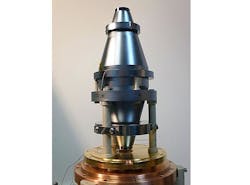Silicon-resonator-stabilized laser has linewidth of only 0.01 Hz
Two independent lasers, each with their own silicon Fabry-Perot cavities, and with laser linewidths of just 0.01 Hz have been created by researchers at Physikalisch-Technische Bundesanstalt (PTB; Braunschweig, Germany) and JILA, National Institute of Standards and Technology and University of Colorado (Boulder, CO).1 This is a world record, and far smaller than the more-usual kilohertz- or megahertz-scale linewidths.
Cooled to 124 K, the lasers have a beat note between them of as small as 5 mHz at their 194 THz operating frequency (1545 nm wavelength). The mutual phase coherence times for these two lasers range up to 55 s. The thermal Brownian noise of the cavity mirrors is what limits the linewidth of these lasers from being even narrower.
Since there was no other comparably precise laser in the world, the scientists working on this collaboration had to set up two such laser systems straight off. Only by comparing these two lasers was it possible to prove the outstanding properties of the emitted light.
The core piece of each of the lasers is a 21-cm long Fabry-Perot silicon resonator. The two resonator mirrors are are kept at a fixed distance using a double silicon cone. Stabilization electronics ensure that the light frequency of the laser constantly follows the natural frequency of the resonator.
Light already used for precision measurements
The new lasers are now being used both at PTB and at JILA in Boulder to further improve the quality of optical atomic clocks and to carry out new precision measurements on ultracold atoms. At PTB, the ultrastable light from these lasers is already being distributed via optical waveguides and is then used by the optical clocks in Braunschweig.
"In the future, it is planned to disseminate this light also within a European network," says Thomas Legero, one of the PTB researchers. "This plan would allow even more precise comparisons between the optical clocks in Braunschweig and the clocks of our European colleagues in Paris and London." In Boulder, a similar plan is in place to distribute the laser across a fiber network that connects between JILA and various NIST labs.
The scientists from this collaboration see further optimization possibilities. With novel crystalline mirror layers and lower temperatures, the disturbing thermal noise can be further reduced. The linewidth could then even become smaller than 1 mHz.
Source: PTB
REFERENCE:
1. D. G. Matei et al., Physical Review Letters 118, 2632202 (2017); https://doi.org/10.1103/PhysRevLett.118.263202

John Wallace | Senior Technical Editor (1998-2022)
John Wallace was with Laser Focus World for nearly 25 years, retiring in late June 2022. He obtained a bachelor's degree in mechanical engineering and physics at Rutgers University and a master's in optical engineering at the University of Rochester. Before becoming an editor, John worked as an engineer at RCA, Exxon, Eastman Kodak, and GCA Corporation.
